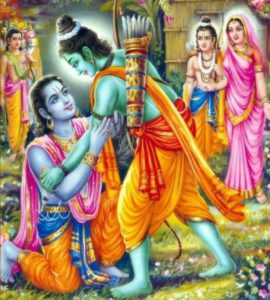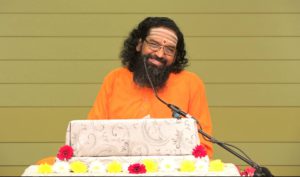Yagna on ‘Shri Bharat Sharanagati’ – Part 3 August 2017
Talks on “Shri Bharat Sharanagati” – Part 3 – by Swami Abhedananda
(Gyan Yagna conducted from 1st Aug till 6th Aug, 2017)
Key Points from the Discourses
Day 1
On the inaugural day of the monthly yagna on “Power of Surrender” at CMSA Durban, Swami Abhedananda beautifully described Shri Bharatji’s character with his myriad qualities. Here are few valuable take-aways from the discourse:
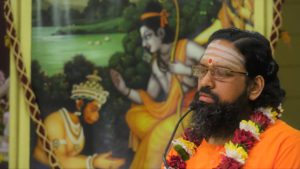 Our biggest need in life is to inculcate the higher values and qualities. Unfortunately, we are aware of our external requirements but pay little attention to our internal requirements. The day one starts attending to his internal requirements, he becomes a saint. Let us try to unveil the values that are enshrined in Ramayana through the deep character of Shri Bharatji.
Our biggest need in life is to inculcate the higher values and qualities. Unfortunately, we are aware of our external requirements but pay little attention to our internal requirements. The day one starts attending to his internal requirements, he becomes a saint. Let us try to unveil the values that are enshrined in Ramayana through the deep character of Shri Bharatji.
Shri Bharatji’s Dispassion
When the whole kingdom of Ayodhya was offered to Bharatji, even then his mind was not at all attracted towards it. All he wanted was to go to Bhagwan Ram and bring Him back. Bharatji said, “Unless I see the feet of Bhagwan Ram, my burning heart can’t be quenched.”
Shri’s Bharatji’s Acceptance
When Bharatji wanted to go from Ayodhya to Chitrakoot to bring back Bhagwan Ram, he could have gone alone, but he took everybody along. In his eyes, everyone was a devotee of Bhagwan Ram. He never thought of himself as a bigger devotee than others. When the whole troop started, at that time Kaikayi was hesitating, but Bharatji let her come along too.
Shri Bharatji’s love for Bhagwan Ram:
- Around the time Bhagwan Ram was to go to the forest, Bharatji started seeing bad dreams. He started doing abhishek of Lord Shiva with the sole prayer that – ‘Let nothing happen to my brother Ram!’
- When Bharatji goes to Bharadwaj rishi’s ashram, Bharatji was feeling very ashamed. Rishi Bharadwaj said, “Oh Bharat! Even if you had taken the kingdom, you wouldn’t have been at fault. The fruit of all our sadhana was that we had darshan of Bhagwan Ram, but the fruit of darshan of Bhagwan Ram is your darshan!” Bharatji said, “I am not troubled because my father has passed away or my mothers are widows. I am not troubled because the kingdom is without Ram. My trouble is that the one who is meant to live like a king and enjoy the kingdom, is wandering from forest to forest and eating in his bare hands & sleeping on the floor.”
- Unless in our life the joy of God is important, we will never be happy. All sadhana in life is – “Through my effort, through my bhaav, through my speech, let God become important, let God become happier.” This is the path of devotion which Bharatji has described. Unhappiness in anybody’s life only shows that Lord is not pleased with him.
- In life, we need a lot of devotion, we need a lot of love for Bhagwan. ‘Loving’ means ‘getting thirsty for Bhagwan.’ You don’t know what situation will come in life. Everybody is standing on crossroads here. It is only Bhagwan who can help us, take care of us, and save us from all our problems at the physical, intellectual and spiritual levels.
Shri Bharatji’s Deenta
- ‘Deenta’ in simple words means “I accept my fault. Please forgive me. I made mistakes. Please tell me how I can improve.” Deenta is very much required in our life. If our thought process starts with the thought that “I am right”, then the chapter is closed and there is no room for improvement.
- Bharatji is personification of deenta. When Bharatji was asked to take the kingdom, he said, “What are you asking? Effect is always harder than the cause. Like iron is harder than the mud. I am the effect of hard-hearted Kaikayi, how can I be soft? To such a hard person if you give the kingdom, the whole earth will become miserable.”
- We have little qualifications and little achievements, and we start blowing our own trumpet. Bharatji’s qualification was such that Bhagwan Ram used to do japa of Bharatji. Deenta alone pleases the Guru and the God.
- While going towards Chitrakoot, Bharatji stopped in between. When Shatrughanji asked why he stopped, Bharatji said, “The tribal people know that I am coming. What if they run towards bhaiya Ram and tell that I am coming and bhaiya may leave Chitrakoot listening my name?” Such was Bharatji’s deenta! He considered himself as very small and bad in front of Bhagwan Ram.
Shri Bharatji’s Renunciation
- Bharatji was the king of renunciation (maha-tyagi). Seeing Bharatji’s renunciation even Guru Vasishtha declared, “Your responses are so brilliant and so full of sacrifice that I cannot fathom them.”
- All relations are based on sacrifice alone. A husband cannot love his wife, or a wife cannot love her husband if they don’t sacrifice for each other. Every relation’s sweetness and joy is based on sacrifice. A person’s charm is his ability to give-up anything for his beloved. Bharatji’s charm was that he could go to any extent to please Bhagwan Ram. Bharatji’s only mantra was – “May Bhagwan Ram win and may I lose.”
Day 2
On the second day of the monthly yagna, Swami Abhedananda enlightened the audience with the meaning of Bhakti & Love for the Lord. He talked about the importance of humility on the path of Bhakti. A few excerpts from the day’s discourse are as under:
- Life is not always what we want it to be; it’s a series of unexpected events, and to face those unexpected events we need a lot of devotion and dispassion; much more than we need money & possessions. It is better to be a poor person outside, than have a poor mind inside. The true wealth of mind is seen in Shri Bharatji’s character.
- A seeker is the one who leaves his worries to the Lord and is assured that the Lord will take care. The biggest virtue which we require in life is Bhakti. To know Bhakti’s true meaning, its important to go through the character of Bharatji.
- In the life of Bharatji, the meaning of Bhakti was – being a saint, a devotee and a servant of the Lord. His only goal in life was to give joy to Bhagwan Ram.
Bharatji’s love for Bhagwan Ram
- In Chitrakoot, when Bhagwan Ram said, “Whatever Bharat will say, I will accept that,” listening to Ramji’s words, everybody got very happy. Everybody thought that Bharatji would request Bhagwan Ram to come back to Ayodhya. At that time Bharatji got-up with his eyes full of tears and body shivering and he thought, “What shall I say?”
- Then Bharatji said, “I know the nature of my bhaiya Ram. I am the culprit but bhaiya Ram is not angry on me. He has special love for me. In our childhood, bhaiya Ram used to make me victorious all the time by getting defeated himself. He never did anything against me.” Bharatji had ocean of bhaav (emotions) for Bhagwan Ram. Through his words, Bharatji was expressing his gratitude and love for Bhagwan Ram.
- In Dohawali, it comes that Ramji and Bharatji, when they were small babies and they used to walk, Ramji being little older used to hold Bharatji whenever he would fall down. Today, listening to Bharatji, Bhagwan Ram’s eyes went down and He said, “Bharat, today you hold me. Those days I used to hold you, but your love is such that I will lose myself.” This is the swabhaav (nature) of Bhagwan; He is very soft. Bhagwan forgives us; He overlooks our faults. If Bhagwan took account of all our actions, we wouldn’t be listening to His glories.
Bhakti – The path of becoming small
- In Bhakti, one cannot hoist his own flag. To make one line bigger, we have to make the other line smaller. Hanumanji could have killed Ravan but he wanted to make Bhagwan Ram bigger. He wanted that Lord’s glory alone should be there. When Shivji was deciding which form to take in Ram avatar, He thought of taking the monkey form, because monkey is an animal which can be ridiculed and which can still perform the seva of the Lord. Such should be the egoless-ness of a servant of Lord.
- Bhakti is the path of self-abnegation and self-destruction. It is the path where we have to destroy ourselves and not assert ourselves. To love someone is not easy. Loving requires that we have to give-up our desires, our likes and dislikes. In love, we have to get defeated by the beloved. A devotee is the one who has learnt to obliterate his desires.
Day 3
On the third day of the monthly yagna, Swami Abhedananda shared the secret of happiness in life; it is having the inspiring goal of serving the Lord and making Him happy vs serving our own small self. Swamiji described beautifully how Bharatji epitomizes this. Below are a few gems from his discourse:
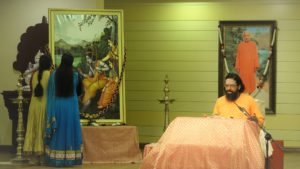 Giving-up Small & Aiming for Big
Giving-up Small & Aiming for Big
- Success of life is in losing what is false in us and giving-up the small in us. The goal that should be kept in our mind is not the outer success, but the bigger goal of losing our wrong small self, our worried and desiring self. All our tensions, worries and struggles in life are because we want to grow separately from Lord’s wish; we have our separate desires and expectations.
- We are moulded in such a manner that our goal in life is only to earn money, have a family, have a good house, and a good job. That’s it! And when we go out in the world, we feel many of our dreams get shattered. It is only the small dreams that get shattered; big dreams don’t get shattered. If we have a desire to become an empty vessel so that Lord can fill us with His wish & will – that dream cannot be shattered.
- Human mind is not made for small dreams. Human mind is made for surrender, it is made for dissolving our ahankaar (ego), it is made for pounding our vasanas, it is made for giving up our wrong identity. The whole character of Shri Bharatji is the manifestation of this goal.
Whom are you making happy?
Shri Bharatji says in his conversation with Bhagwan Ram, “Guru prasanna sahib anukula, miti malin man kalpit sula”, “Knowing that my Guru and my Lord are happy on me, the imaginary sorrow of my impure mind is gone.”
- Everybody wants that someone big should be happy with him. Somebody is happy means, he is not keeping any differences. If Lord is happy, it means that we have done sufficient sacrifice, tapasya, sadhana and seva. It’s a big fulfillment of have Lord’s happiness. Some people are naturally very happy because they have made God happy by their actions and intentions. God is seated in our heart and so it is impossible that we are happy when God is unhappy with us.
- Bharatji continued and said, “Whole world may be against you, but if Bhagwan is with you, who can do anything wrong to you!” As long as Bhagwan likes you, don’t bother too much who likes or dislikes you in this world. Nature of the world is such that you can’t please everybody.
- The problem is that we don’t please God. We please the worldly people, we please our vasanas. To please Lord, one has to correct his intentions and actions, and do austerity and tapasya. Young Dhruv, who was snubbed by his father, when he came back after doing tapasya, he was prostrated by everybody, even his father welcomed him with flowers. And the cause was – one who has pleased God, everyone bows down to him.
- To the extent the Lord is happy with you, to that extent you are powerful. The fight between Duryodhan and Bheem was not between Duryodhan and Bheem, it was between who was happy on Duryodhan and who was happy on Bheem. On Duryodhan, nobody was happy and on Bheem, Bhagwan Krishan was happy.
Essence of Seva (Service):
- We are happy only on that person who has served us in some way or the other. If a mother had not served the child, the child wouldn’t be happy on the mother. If the Guru does not serve the disciple, the disciple wouldn’t be happy. We cannot make a person happy unless we serve him a lot.
- Serving is very difficult, because in serving we have to give up our smallness. We cannot force our wish while serving. When we serve, we go to obliterate our wish. One cannot be insistent or greedy while serving. If one loves his comforts, emotions, relations, food and sleep, he can never serve. The very demand of serving is, “leave it”!
- If one wishes to do seva, he must do the parayan (regular recital) of Bharatji’s prasang. In this prasang all intricacies and principles of seva are mentioned.
Sadhuta (saintliness) of Bharatji:
- Even though Bhagwan Ram had said He would do whatever Bharatji says, Bharatji did not insist Ramji to come back. He replied saying, “Oh Lord! Everybody wants that You should return, but to follow what You say is million times better than our wish.”
- Bharatji proposed various options like – i) He would go to the forest along with Shatrugan and Bhagwan Ram can return to Ayodhya, or ii) Lakshman can go back, and he himself would go with Bhagwan Ram, or iii) All three brothers can go to the forest, while Bhagwan Ram and Mother Sita can return. Having said that, Bharatji flet that he spoke too much, so he seeked forgiveness by saying, “I blabbered too much. You please do that which makes you happy. I am the ocean of all fallacies. I swear in the name of feet of my Lord, whatever You say, leaving every insistence, we will do that.” This was the egolessness of Bharatji’s mind. He had a very soft heart. He never insisted Bhagwan Ram to do as he wished. Among Sadhus, the greatest Sadhu is Shri Bharatji!
Day 4
On the fourth day of the monthly yagna, Swami Abhedananda brought out the many joys of spiritually inclined living. While the ultimate fruits of a spiritually aligned life are glorious, the journey is equally rewarding too. Swamiji shared the many joys and glories that comes to those with noble attributes like humility, surrender, renunciation and selfless service. Below are a few excerpts from the uplifting discourse:
- Bharatji’s character shows that the joy of humility is more than the joy of ahankaar because when the mind is extremely humble, it leaves all its desires. And the moment you leave your desires, mind becomes very quiet.
- Humility is a trait in a person that makes him give-up his sense of bigness. In his mind, he considers himself very small and insignificant in front of the Lord. He thinks that his desires, his opinion, and his joys and sorrows have no value. Such a mind is a melted mind. And a melted mind is more powerful than a hard mind because it leaves all its insistences as it operates with the power of the a Lord having forsaken its separate existence.
Joy of Surrender
- Whenever Shri Bharatji used to see Bhagwan Ram, only one thought was there – “Oh Lord! How I can take away all Your sorrows, and how I can give my life to You?” The joy of surrender is much more than the joy of keeping our desires. ‘I do what I like’ has less joy than ‘I do as you like!’ You have a big satisfaction that you gave your life to someone higher. You didn’t live just for your small family, or your kaam (desires) & krodh (anger).
- Don’t think that satisfaction is only in earning money, or eating good food, or going to high-profile parties. To sit at somebody’s feet and put your head at his feet has a lot of satisfaction. The satisfaction of doing prostrations is much bigger than the satisfaction of receiving prostrations. The satisfaction of serving is more than the satisfaction of taking service.
- Spiritual life is a clarion call that ‘I will go ahead and I will march to be beaten, to be defeated by the Lord. Let my vasanas, let my separate desires, all get consumed in this conflagration of commitment.’ Life is meant to live as my Lord wants, as my master wants, as my teacher wants.
- Bharatji’s character demonstrates to us the kind of bhaav we should have, the kind of surrender we should have, the kind of sacrifice we should be able to do; it tells us how to please God. By listening about it continuously, may be one day our hard ego will soften, and we will leave our insistences, and we will also become dear to Lord and will find a place at the dust of His lotus feet.
Glory of Renunciation
- Goswami Tulsidasji says that when King Janak and Sunaina (father and mother of Sitaji) went to see Sitaji in Chitrakoot, they both got very happy seeing the austere attire of their daughter. They thought, “Great is our daughter. We are very fortunate. To give birth to such a daughter is the fulfillment of becoming a parent.”
- To give birth to such a child who wants to renounce everything for God, the parents must have done some austerity in the past births. In modern days, everybody wants their children to become an engineer, or doctor, or businessman, and live a wealthy life; very rare are those who say that “I want my child to become a saint. If he/she wants to pursue a higher goal and attain God, I will not become a hindrance in their path. I will give my whole-hearted support.”
- Such are the boys and girls who become saints and give light to the society. They show to the world that you can live without kaam (sensual enjoyment) and desire for money or children. Their only desire is to please the God and upliftment of the humanity; and therefore our hands fold in front of such people.
- One renunciate person is heavy on many bhogis (indulgent people) because he can bring peace and quietude in the lives of many. Don’t think that a renunciate is a poor thing. He has the strength of the Lord, he has the strength of his sadhana, sacrifice, and self-control.
Joy (& sweet pain) of Serving:
- Seva Dharma means, ‘I am living to give you joy’. Seva Dharma is very difficult because we have to give up our likes, dislikes, ahankaar, comforts, laziness, and selfishness. There is a pain involved in giving these up. If you cannot tolerate the pain of seva, you cannot do seva.
- We want to serve when we get the joy of serving and joy of serving comes only when we serve more. This is how it works.
- The opportunity to serve also doesn’t come easily. Opportunity to eat is everyday but opportunity to feed is not everyday. Opportunity to sleep is everyday but opportunity to be awake and serve is not everyday. The joy of sacrificing for someone is not easily available. The day you will start liking the pain of serving, you will become a servant. The joy of serving will be more important than the pain you experience while serving. And the big prasad of seva is that Bhagwan becomes happy with you. That is the success of life.
Day 5
On the fifth day of the gyan yagna, Swami Abhedananda beautifully described Seva as the most foundational quality for any seeker, or in fact any one to become a positive contributor to the society, nation or an organisation. Swamiji also painted the whole scene of Bharatji’s congregation meeting with Bhagwan Ram for his Ayodhya return. Via this, Swamiji brought out the beautiful characters of Bhagwan Ram & Bharatji. Below are a few excerpts from the discourse:
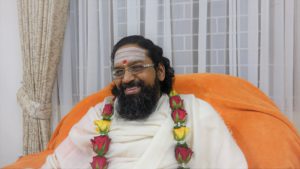 Seva – the Foundational quality for seeker-hood
Seva – the Foundational quality for seeker-hood
- Seva means whatever we get, we multiply it and give it back to the Lord. Seva means whatever capacities God has given us – physical, financial, social and spiritual, we give it back to the Lord in some form or the other.
- Gita says that one who does not give, he is a thief because inspite of getting a lot, he didn’t offer anything back. Sense of seva is the secret of both Karma Yog and Bhakti Yoga.
- The joy and happiness in anybody’s life is only because he has seva dharma and his seva buddhi is well developed. Every moment is potent to provide an opportunity to serve.
- Serving is a way to purify our mind because when we start serving we understand that we are less qualified to serve, we would thus attempt to increase our qualification by reducing our negativities (anger, attachment, jealousy etc).
- Those who don’t serve, there is a guilt born in them as they grow old that ‘I took more than what I gave. I could not give as much as I could have given to my Guru, God and society.’ The goal of a seeker must be that each drop of his blood and each cell of his body must be consumed in the fire of seva.
- Any house or an institution is made only because there are selfless people present there. One selfless person can bring a change in the world. Without seva bhaav we cannot become a contributor in anybody’s life.
Guidance by Shri Bharatji’s:
- At the point when everyone in the congregation was indecisive and Bhagwan Ram felt shy of speaking, Bharatji rose and spoke. It is the beauty of Bharatji’s character that he knows exactly the right moment when to speak and what to speak.
- Bharatji helped in providing vivek (right discrimination) to everyone. Describing the riole played by Bharatji, Tulsidasji compares Bharatji to the Varah avatar. As in Varah avatar, the earth was drowned in water, the intellect of everyone in the congregation was drowned in the sorrow. As Varah avatar saves the earth, similarly Bharatji helped everyone to come out of their sorrow. Thus, Bharatji not only provided the right discrimination but also helped to take away the sorrow from people’s heart.
- There are various instances in life where we have very high emotions, but even in those times we must never lose the sight of what is our duty and dharma.
Bharatji’s description of Bhagwan Ram:
Bharatji then spoke looking at Bhagwan Ram, ‘’He is my Lord, He is my father, He is my mother, He is my friend, He is my Guru, He is my master, He is my conscience. The great thing about my bhaiya Ram is that He is very simple and full of good conduct. If anybody offers even a namaskaar to Him, bhaiya Ram’s heart melts very fast. We have a lot of faults, but He remembers only the qualities… such a great swami He is! He is the greatest of all, the Vedas say that. No one has a nature like my brother. Because of my childish nature, I just barged in the quiet place of Chitrakoot with the whole congregation & army. I did big mistake oh my Lord. Please forgive me and please say what I must do now.” Saying so Bharatji feel at the feet of Bhagwan Ram with anxiety.
Bhagawan Ram’s advice for Bharatji:
Bhagwan Ram then held the hands of Bharatji softly and said, “Oh Bharat, you are the holder of all Dharma. There is no one who is like you. You know the neeti (principles) of our clan. Our father gave up his life to keep his words. You know what is good for me and what is good for you. I depend on you Bharat. Without our father we were all lost, but it was Vasishthji and Janakaji who protected us. Like the Sheshnaag (celestial serpent) protects the earth, similarly our Dharma is protected by the agnya (orders) of our mata (mother), pita (father) and Guru. If we follow someone higher then we will never go on the wrong track. So, learn to obey and follow them without insistence. Bharat, make me do and you also do that which is as per the Dharma and what Guruji says. I know you will have a lot of pain, but for tolerate it for me. Bharat, you are very soft but I am going to say very hard words because time is not good. When somebody hits you with the sword, the hands come to protect the face and head. Hands bear the brunt to save the other parts of the body. We are like the face, you become the hand. You bear the brunt.”
Though Bharatji wanted Bhagwan to come back, he followed Bhagwan’s decision without any further discussions and justifications. Such is the great character of Shri Bharatji!
Day 6
On the concluding day of this month’s yagna, the audience was once again taken by Swami Abhedanandaji into the greatest depths of Shri Bharatji’s character. Some of the most beautiful and life-changing lessons from yesterday’s satsang are as below:
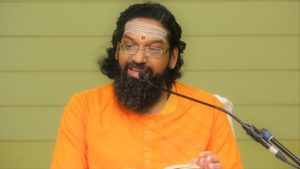 Shri Bharatji’s Oceanic character
Shri Bharatji’s Oceanic character
- Shri Bharatji’s character is like an ocean in which various precious pearls and gems are hidden. Every great quality in a person makes him stronger to face the world, while every weakness of a person brings sorrow, insecurity, sadness and disturbances to him. Bharatji did not have even a single weakness in him.
- Bharatji’s seva bhaav was so intense that his principle was “nahi aagya sam susahib seva”, which means “there is no bigger seva than following the orders of the master.” He had the ability to take the wish of Bhagwan Ram in his heart and live and die for that wish. Renunciation, Guru-Bhakti (devotion for the teacher), Ishwar-Vishwass (faith in Lord), sensitivity towards the Lord – Bharatji is the acme of all these emotions.
- The purpose of discovering higher joys in life is indicated in Bharatji’s character. He exhibits that the joy of giving is higher than the joy of taking; the joy of a desire-less person is more than the joy of one who fulfills his desires; the joy of humility is more than the joy of arrogance. These are the higher joys which when a person discovers, he becomes much quieter.
- Whenever you see two people living with mutual selflessness and surrender, it’s a good sight. It is a very beautiful sight to see a surrendered servant serving the master who is great and worth surrendering to. Bharatji was like that servant to Bhagwan Ram.
Departing of Shri Bharatji
- When the decision was made that Bhagwan Ram, Sitaji and Lakshmanji would stay in the forest for 14 years, and Bharatji and everyone else would go back, Bhagwan Ram thought “today is the auspicious day for Bharat and everyone to go back.” But Bhagwan Ram was very hesitant to say so. Even Janakji and Vasishthji couldn’t say anything. Bharatji saw from a distance and sensed that his bhaiya Ram was shy and embarrassed to say that. Knowing the thoughts of the person whom you are serving and thinking that he shouldn’t have even the slightest of inconvenience – this is the essence of seva. Even the slightest pain of the master appears a lot in the servant’s heart.
- Bharatji got up bravely and offered his pranaams and said, “Oh my Lord! You kept my interest. Because of me, You suffered so much. I came with the whole army. Now please give me the permission to go back. Please tell me how I should live in Ayodhya for 14 years. Oh Lord! I was very distressed without You when I went to Ayodhya. I couldn’t tolerate and like a small boy, I came running to you. I planned that I would coronate You in the forest itself. My distress and Your nature of accepting me, made me little stubborn. Please forgive me. Teach me how to pass these 14 years. How to serve You?”
- Bhagwan Ram took Bharatji closer to Him and said, “Bharat, you need not worry. Overseeing you are Guru Vasishthji and also Janakji, they will take your care. Oh Bharat! Mine and your highest effort is to follow our father, mother and Guru. If you follow them, you will never fall in life.”
- On receiving permission from Ramji, Bharatji requested Bhagwan to give him something for support, with which he could go through these 14 years. Bhagwan thus gave His padukas (sandals), which Bharatji happily accepted by taking it on his head. Bharatji and Shatrughnji offered dandwat pranaam to Bhagwan Ram and Sitaji and started leaving. This was the most heart-rending moment for everyone. Not only humans, but animals also started crying. As Bharatji moved away and Bhagwan got out of his sight, he cried inconsolably like a child.
- Very rare are those people who love God, but rarer are those who miss God. We miss our parents, we miss money, we miss our children, we miss fame, but real fortune is that we miss God. Real fortune is when a person thinks, “I can live without the world but I can’t live without God.” As Bharatji left, Bhagwan Ram also started crying.
Shri Bharatji’s Sadhna
- Bharatji had infinite emotions but he never lost his discrimination. On getting back to the kingdom, Bharatji designated work to people to ensure that Ramji’s kingdom was even better after 14 years when Ramji comes back. Bharatji went to his Guru Vasishthji, and said, “Gurudev, my brother is sleeping on the floor. If I sleep on the bed, it won’t be correct. My brother is eating roots and fruits. If I eat the royal food, it won’t be good. My brother is living in the forest. If I live in the palace it won’t look good. Can I also follow the rules that my brother is following?” Vasishthji replied, “Bharat, you please don’t ask what is the rule, whatever you do is the Dharma.”
- Bharatji then placed Lord’s Padukas on the throne and said that it is the Lord who will rule now. This is the principle of Hinduism – we are all representatives of God and not the position holders. The teacher of this principle is Shri Bharatji. Bharatji had no vasna for power or position, no desire of his own; he just followed what the Lord wanted. This is Karma Yog.
- Bharatji went to a place called Nandi-gaon, outside Ayodhya, and stayed there. He matted his hair. Bharatji used to visit the palace every day to take care of the kingdom but was never attracted by the various luxuries of the palace. Nobody had asked Bharartji to follow any such rules. Love’s demand is ‘sacrifice’.
- Bharatji’s love for Bhagwan Ram rose and shone with each passing day. People thus came to have darshan of Bharatji; even the sannyasis came and offered prostrations to him. He did puja of Lord’s Padukas every day and the saints say that the Padukas used to speak to Bharatji. Bharatji thus performed tapasya amidst all bhog. Such was the great character of Bharatji!
Listening or reading about Shri Bharatji will purify our hearts and make us a devotee of Bhagwan and give us dispassion from the world.



